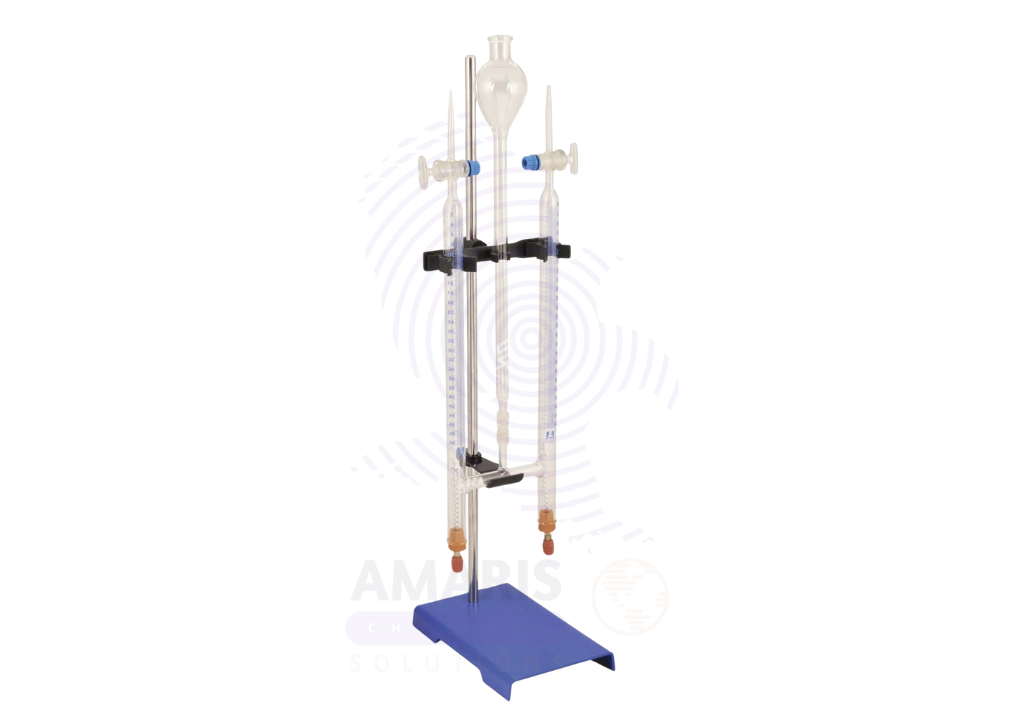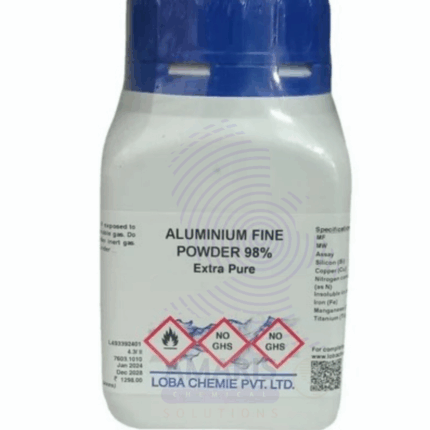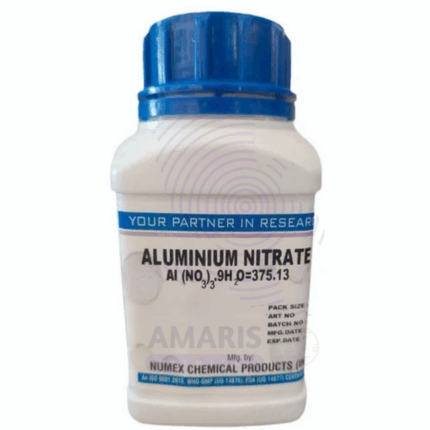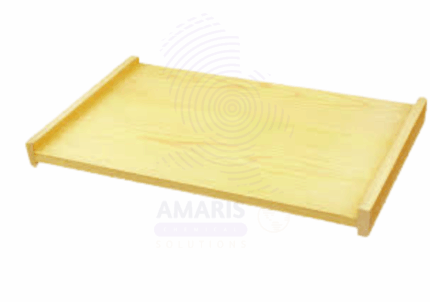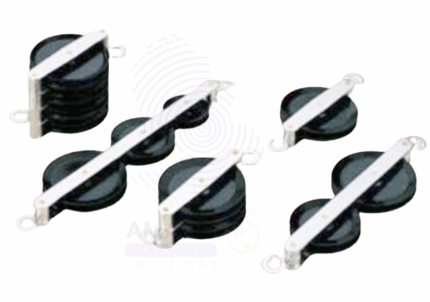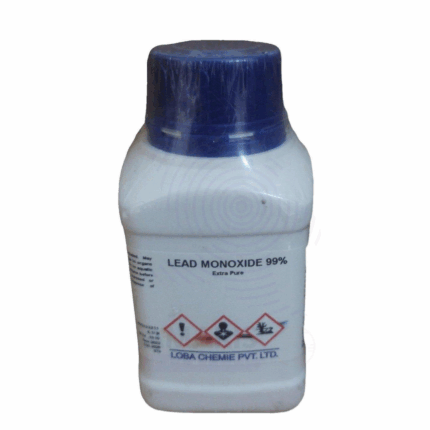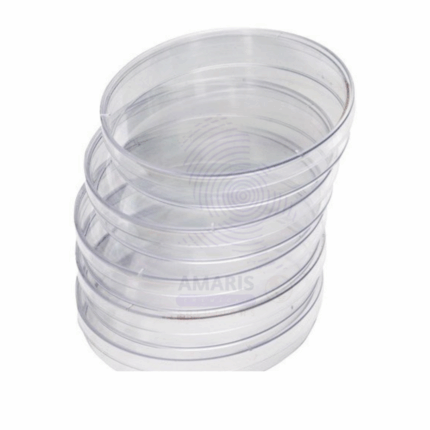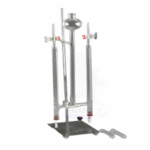
Hoffman Voltameter
$ 58.16 Original price was: $ 58.16.$ 58.05Current price is: $ 58.05.
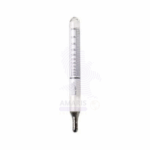
Hydrometer Heavy and Light
$ 14.88 Original price was: $ 14.88.$ 14.71Current price is: $ 14.71.
Hoffman Voltameter Complete
Whatsapp Order
Hoffman Voltameter Complete is a comprehensive electrolysis apparatus designed for the demonstration and measurement of water decomposition into hydrogen and oxygen gases. The complete setup includes a borosilicate glass main body with two graduated vertical tubes, platinum or carbon electrodes, rubber stoppers or connections, and an electrode support stand for stability. It is widely used in educational, research, and analytical settings to demonstrate the fundamental principles of electrolysis, redox reactions, and gas laws. The apparatus allows for accurate measurement of the gas volumes produced, typically in a 2:1 hydrogen-to-oxygen ratio, verifying stoichiometric relationships in chemical reactions.
Description
Table of Contents
Toggle
Hoffman Voltameter Complete
Primary Uses
- Electrochemical and Educational Applications
- Demonstrating electrolysis of water for teaching the principles of decomposition reactions.
- Measuring and comparing the volumes of hydrogen and oxygen gases generated during electrolysis.
- Teaching Faraday’s laws of electrolysis and stoichiometry in chemistry labs.
- Studying redox reactions and the behavior of electrolytic cells in academic settings.
- Visualizing gas evolution and electrode activity in real time.
Secondary Uses
- Research and Laboratory Analysis
- Analyzing purity of electrolyte solutions based on gas generation efficiency.
- Comparing efficiency of different electrode materials (e.g., platinum vs. carbon).
- Supporting R&D in electrochemical systems and gas separation methods.
- Performing controlled experiments related to electrical conductivity and ionic movement.
KEY PRODUCT FEATURES
1. Basic Identification Attributes
- Material: Borosilicate glass body with platinum or carbon electrodes
- Design: Dual gas-collection tubes with central electrolyte reservoir
- Accessories: Rubber tubing, stoppers, electrode connectors, stand/base
2. Physical & Chemical Properties
- High chemical resistance to acids and electrolytes
- Excellent thermal stability for lab environments
- Transparent for easy observation of gas formation
3. Safety & Hazard Attributes
- Glass structure is fragile; risk of breakage if mishandled
- Electrolysis produces flammable hydrogen gas; use in ventilated area
- Possibility of minor electric shock during operation if improperly handled
4. Storage & Handling Attributes
- Store in upright, padded compartments to prevent glass damage
- Clean all parts thoroughly after use to avoid chemical residue buildup
- Use electrode clamps or supports to stabilize during operation
5. Regulatory & Compliance Attributes
- Complies with ISO and ASTM lab apparatus standards
- Approved for use in GMP and educational laboratories
6. Environmental & Health Impact
- Reusable and environmentally sustainable; no toxic byproducts
- Hydrogen and oxygen gases are clean and non-toxic, but require controlled release
SAFETY HANDLING PRECAUTIONS
Safety Handling Precautions
- Use PPE: gloves, goggles, and lab coat during operation
- Keep away from open flames due to flammable hydrogen production
- Always disconnect power before cleaning or maintenance
First Aid Measures
- For cuts from broken glass, disinfect and bandage the wound
- In case of electric shock, cut power immediately and seek medical help if symptoms persist
- If gas is inhaled in concentrated form, move to fresh air and monitor for discomfort
Firefighting Measures
- Apparatus is non-flammable, but hydrogen gas is highly flammable
- Use CO₂ or dry powder extinguishers in case of surrounding fires
- Evacuate the area if hydrogen is released in enclosed space
Related products
Aluminium Metal Fine Extra Pure
Aluminium Metal Fine Extra Pure is a high-purity, silvery-grey powder composed of finely divided aluminum particles, ideal for precision laboratory work and specialized chemical reactions. Known for its high surface area and excellent reactivity, it is widely used in thermite reactions, metallurgical experiments, and the synthesis of aluminum-based compounds. Its fine particle size enhances its role as a reducing agent in organic and inorganic chemistry, as well as in combustion and pyrotechnic research. The extra pure grade ensures minimal trace impurities, supporting consistent and accurate results in sensitive analytical and preparative procedures. Due to its flammability and potential for dust explosions, it must be handled with caution in well-ventilated areas and stored in sealed, moisture-free containers.
Aluminium Nitrate Extra Pure
Aluminium Nitrate Extra Pure is a high-purity, white crystalline compound that is highly soluble in water and widely used in laboratory chemistry for analytical, synthesis, and research purposes. It serves as a reliable source of aluminum ions in solution, making it valuable in qualitative analysis, coordination chemistry, and materials science studies. This compound is often utilized in the preparation of other aluminum salts, as a nitrating agent, and in controlled oxidation reactions. Its extra pure grade guarantees minimal interference from contaminants, ensuring accurate, reproducible results in sensitive experimental work. Aluminium Nitrate should be stored in tightly sealed containers, away from moisture and incompatible substances, due to its oxidizing nature and hygroscopicity.
Boyle’s Law Apparatus
Boyle’s Law Apparatus is a precision laboratory instrument designed to demonstrate and verify Boyle’s Law, which states that the pressure of a given mass of gas is inversely proportional to its volume at constant temperature. The apparatus typically consists of a sealed cylinder with a movable piston or syringe, pressure gauge, and volume scale, allowing students and researchers to observe and measure the relationship between pressure and volume in gases. It is widely used in educational and research laboratories to teach fundamental gas laws and perform experimental validation of theoretical principles.
Dissecting Board / Soft Board
Dissecting Board / Soft Board, also known as Soft Board, is a laboratory accessory designed to provide a stable and cushioned surface for securing biological specimens during dissection procedures. Typically made from soft, durable materials like foam or rubber, the board allows easy pinning of specimens without causing damage or slippage. It is widely used in medical, veterinary, educational, and research laboratories for anatomical studies, surgical training, and sample preparation. The soft texture enhances precision and control, facilitating effective specimen manipulation and minimizing tissue trauma.
Double, Triple, Single Lab Pulley
Lab pulleys—available as single, double, or triple configurations—are precision-engineered mechanical devices used in laboratory settings to change the direction of force or lift loads with reduced effort. Typically made from durable materials such as metal alloys or hard plastics, these pulleys consist of grooved wheels that guide ropes or cords smoothly during experiments and mechanical setups. Single pulleys have one wheel, doubles have two, and triples have three wheels, allowing different mechanical advantages depending on the setup. Lab pulleys are essential in physics education, mechanical experiments, and engineering demonstrations where principles of force, tension, and motion are studied.
Expansion of Liquid Apparatus
Expansion of Liquid Apparatus is a laboratory device designed to measure the volumetric expansion of liquids when subjected to temperature changes. It consists of a graduated glass tube connected to a bulb containing the test liquid. As the liquid heats and expands, the change in volume is observed and recorded through the graduated scale. This apparatus is essential in physical chemistry and materials science for studying thermal expansion coefficients and understanding liquid behavior under varying thermal conditions. It is commonly made from chemically resistant borosilicate glass to withstand thermal stress and chemical exposure.
Lead Monoxide Extra Pure
Lead Monoxide Extra Pure, also known as litharge (PbO), is a fine yellow or reddish powder widely used in analytical chemistry and industrial processes. Its high purity makes it suitable for laboratory-grade reactions, especially in the manufacture of lead-based compounds, ceramics, glass, and batteries. In the ceramics and glass industries, it enhances the brilliance and stability of glazes and optical glass. In metallurgy, it is used as a fluxing agent during refining. Due to its toxicity and lead content, it requires strict safety handling procedures and controlled storage conditions to prevent contamination or exposure.
PETRI DISH PLASTIC
Petri Dish Plastic is a shallow, cylindrical laboratory container made from clear, chemically resistant plastic materials such as polystyrene or polypropylene. Designed for single-use or limited reuse, plastic Petri dishes provide a convenient and cost-effective alternative to glass, especially in applications where sterility and disposability are priorities. These dishes are commonly used in microbiology, cell


 Preservatives(food)
Preservatives(food) Flavor Enhancers
Flavor Enhancers Acidulants
Acidulants Sweeteners
Sweeteners Antioxidants
Antioxidants Colorants(food)
Colorants(food) Nutraceutical Ingredients (food)
Nutraceutical Ingredients (food) Nutrient Supplements
Nutrient Supplements Emulsifiers
Emulsifiers
 Collectors
Collectors Dust Suppressants
Dust Suppressants Explosives and Blasting Agents
Explosives and Blasting Agents Flocculants and Coagulants
Flocculants and Coagulants Frothers
Frothers Leaching Agents
Leaching Agents pH Modifiers
pH Modifiers Precious Metal Extraction Agents
Precious Metal Extraction Agents
 Antioxidants(plastic)
Antioxidants(plastic) Colorants (Pigments, Dyes)
Colorants (Pigments, Dyes) Fillers and Reinforcements
Fillers and Reinforcements Flame Retardants
Flame Retardants Monomers
Monomers Plasticizers
Plasticizers Polymerization Initiators
Polymerization Initiators Stabilizers (UV, Heat)
Stabilizers (UV, Heat)
 Antifoaming Agents
Antifoaming Agents Chelating Agents
Chelating Agents Coagulants and Flocculants
Coagulants and Flocculants Corrosion Inhibitors
Corrosion Inhibitors Disinfectants and Biocides
Disinfectants and Biocides Oxidizing Agents
Oxidizing Agents pH Adjusters
pH Adjusters Scale Inhibitors( water)
Scale Inhibitors( water)
 Antioxidants(cosmetic)
Antioxidants(cosmetic) Emollients
Emollients Fragrances and Essential Oils
Fragrances and Essential Oils Humectants
Humectants Preservatives
Preservatives Surfactants(cosmetic)
Surfactants(cosmetic) Thickeners
Thickeners UV Filters
UV Filters
 Fertilizers
Fertilizers Soil Conditioners
Soil Conditioners Plant Growth Regulators
Plant Growth Regulators Animal Feed Additives
Animal Feed Additives Biostimulants
Biostimulants Pesticides (Herbicides, Insecticides, Fungicides)
Pesticides (Herbicides, Insecticides, Fungicides)
 Active Pharmaceutical Ingredients (APIs)
Active Pharmaceutical Ingredients (APIs) Excipients
Excipients Solvents(pharmaceutical)
Solvents(pharmaceutical) Antibiotics
Antibiotics Antiseptics and Disinfectants
Antiseptics and Disinfectants Vaccine Adjuvants
Vaccine Adjuvants Nutraceutical Ingredients (pharmaceutical)
Nutraceutical Ingredients (pharmaceutical) Analgesics & Antipyretics
Analgesics & Antipyretics
 Analytical Reagents
Analytical Reagents Solvents(lab)
Solvents(lab) Chromatography Chemicals
Chromatography Chemicals Spectroscopy Reagents
Spectroscopy Reagents microbiology-and-cell-culture-reagents
microbiology-and-cell-culture-reagents Molecular Biology Reagents
Molecular Biology Reagents Biochemical Reagents
Biochemical Reagents Inorganic and Organic Standards
Inorganic and Organic Standards Laboratory Safety Chemicals
Laboratory Safety Chemicals Specialty Laboratory Chemicals(Special Laboratory Equipment)
Specialty Laboratory Chemicals(Special Laboratory Equipment)
 Demulsifiers
Demulsifiers Hydraulic Fracturing Fluids
Hydraulic Fracturing Fluids Scale Inhibitors(oil)
Scale Inhibitors(oil) Surfactants(oil)
Surfactants(oil) Drilling Fluids
Drilling Fluids
 Dyes and Pigments
Dyes and Pigments Bleaching Agents
Bleaching Agents Softening Agents
Softening Agents Finishing Agents
Finishing Agents Antistatic Agents
Antistatic Agents
 Admixtures
Admixtures Waterproofing Agents
Waterproofing Agents Sealants and Adhesives
Sealants and Adhesives Curing Compounds
Curing Compounds Concrete Repair Chemicals
Concrete Repair Chemicals Anti-Corrosion Coatings
Anti-Corrosion Coatings
 Surfactants(cleaning)
Surfactants(cleaning) Builders
Builders Enzymes
Enzymes Solvents (Cleaning)
Solvents (Cleaning) Fragrances
Fragrances
 Electronic Chemicals
Electronic Chemicals Catalysts
Catalysts Lubricants
Lubricants Photographic Chemicals
Photographic Chemicals Refrigerants
Refrigerants Automotive chemicals
Automotive chemicals Pyrotechnic Chemicals
Pyrotechnic Chemicals
 Biodegradable Surfactants
Biodegradable Surfactants Bio-based Solvents
Bio-based Solvents Renewable Polymers
Renewable Polymers Carbon Capture Chemicals
Carbon Capture Chemicals Wastewater Treatment Chemicals
Wastewater Treatment Chemicals
 Pigments
Pigments Solvents(paint)
Solvents(paint) Specialty Coatings
Specialty Coatings Binders/Resins
Binders/Resins Additives
Additives Driers
Driers Anti-Corrosion Agents
Anti-Corrosion Agents Functional Coatings
Functional Coatings Application-Specific Coatings
Application-Specific Coatings
 Fresh Herbs
Fresh Herbs Ground Spices
Ground Spices Whole Spices
Whole Spices Spice Blends
Spice Blends Dried Herbs
Dried Herbs
 Leavening Agents
Leavening Agents Dough Conditioners
Dough Conditioners Flour Treatments
Flour Treatments Fat Replacers
Fat Replacers Decoratives
Decoratives Preservatives(baking)
Preservatives(baking)
 Plasticizers & Softeners
Plasticizers & Softeners Reinforcing Agents
Reinforcing Agents Adhesion Promoters
Adhesion Promoters Vulcanizing Agents
Vulcanizing Agents Antidegradants
Antidegradants Blowing Agents
Blowing Agents Fillers & Extenders
Fillers & Extenders Accelerators & Retarders
Accelerators & Retarders